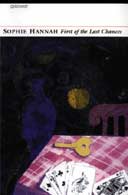
First of the Last Chances
by Sophie Hannah
64pp, Carcanet, £4.95
The best "light verse" shines its light equally on all aspects of human behaviour. Although WH Auden's lyric "O tell me the truth about love" mentions nose-picking, it is finally a moving, as well as amusing, poem. Sophie Hannah is already among the best at comprehending in rhyming verse the indignity of having a body and the nobility of having a heart.
These lines from an early poem, for example, modulate from jokiness into a simile that pins down the mysteriousness of unrequited love as piercingly as Shelley's "The desire of the moth for the star": "I know you're real, which means you must pay taxes, / catch colds and snore. I know you know what sex is. / Still there is something in you that never mixes, // something that smells like the air in silver boxes."
Perhaps, at such moments, the distinction between light verse and heavier kinds of verse is meaningless. The term may nevertheless honourably be applied to the Sophie Hannah poems that take up an everyday matter for the joy of versification itself - where the rhythm bounds dog-like after the distant stick of another rhyme, as in a new poem about ante-natal preparations:
My husband doesn't care if I'm a leaner or a squatter,
Says pregnancy is no excuse for reading Harry Potter.
He isn't keen on Stephanie or Amos or Carlotta.
This change in domestic circumstances means there is less about unrequited love in Hannah's latest collection than in her previous three. But falling for men was always only one of her hobbies. She is equally inspired by people who fall foul of her. The very funny "God's Eleventh Rule" is spoken by a holidaymaker who repeatedly has to insist that she does not want to leave the hotel pool to visit "a hovel / Of charred native art" or "the local slums" (preferring to remain "where teeth are, by and large, attached to gums").
The snarling in this poem is rendered palatably comic by the elaborate rhyming. "Your Funeral", however, with its plainer rhymes, is more discomfortingly angry on the subject of not grieving for a hated relative:
...we, in pinker shades of brown,
watch the undear departed get on down,
thinking of how we wouldn't have her back,
given a god-like choice, not for a stack
of cash, not for a kingdom and a crown.
The slangy, monosyllabic aggression of "get on down" and "stack / of cash" here takes lightish verse to a mirthless but dignified place. This powerful, complicated poem is the volume's emotional peak. Touchingly, it is followed by one that begins, with lilting tenderness, "Dear baby the size of an olive...". Hannah's range as a poet of serious lyrical wit is demonstrated in the song cycle that ends the collection, "A Woman's Life and Loves".
In Cordial and Corrosive, her second novel, the narrator has George Herbert's poems in her car glove compartment, "tucked in between a Nissan Micra manual and a pile of old service receipts". Here, Herbert's combination of formal grace and emotional clarity is evident as one of Hannah's abiding examples as a poet.
"Match" is typically unhypocritical: "Love has not made us nice." The metres of its final two lines, though, echo one of Herbert's most affecting affirmations, the end of "Love (III)":
You must sit down, says Love, and taste my meat:
So I did sit and eat.
All the emotion is in the drop from the long line to the short. Hannah concludes with similarly curtailed simplicity, and a touch of her own distinctive frankness:
But love has made us last.
We do together all that in the past
We did alone; err not as one but two
And this is how I knew.
· Jeremy Noel Tod teaches English literature at the universities of Oxford and East Anglia

